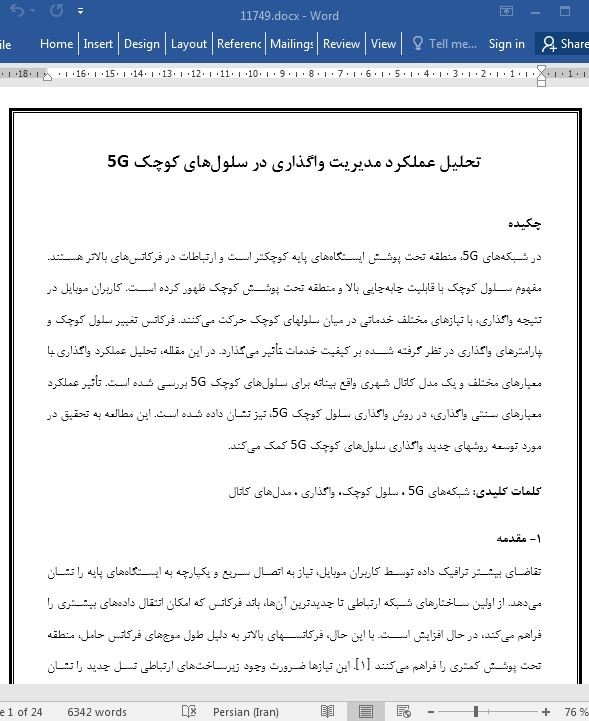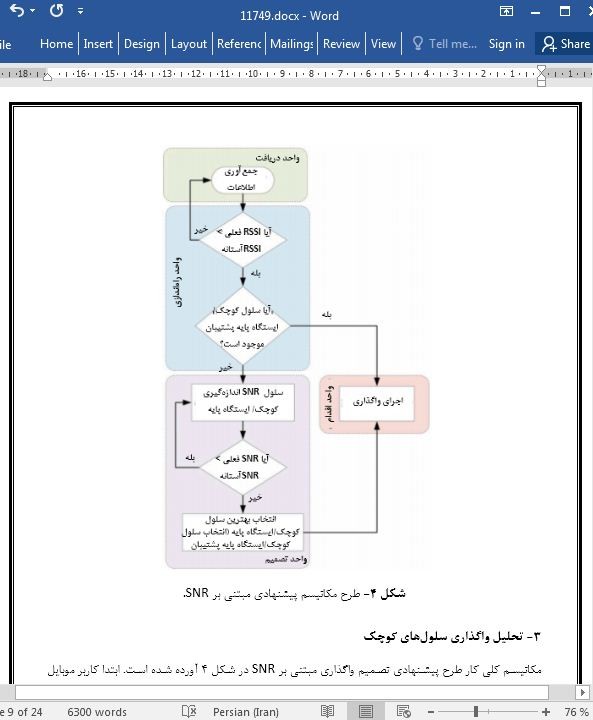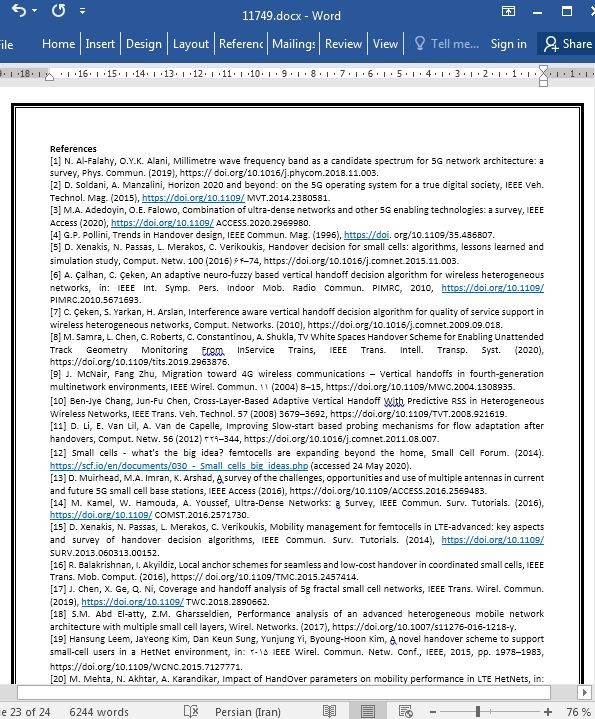
تحلیل عملکرد مدیریت واگذاری در سلولهای کوچک 5G
چکیده
در شبکههای 5G، منطقه تحت پوشش ایستگاههای پایه کوچکتر است و ارتباطات در فرکانسهای بالاتر هستند. مفهوم سلول کوچک با قابلیت جابهجایی بالا و منطقه تحت پوشش کوچک ظهور کرده است. کاربران موبایل در نتیجه واگذاری، با نیازهای مختلف خدماتی در میان سلولهای کوچک حرکت میکنند. فرکانس تغییر سلول کوچک و پارامترهای واگذاری در نظر گرفته شده بر کیفیت خدمات تأثیر میگذارد. در این مقاله، تحلیل عملکرد واگذاری با معیارهای مختلف و یک مدل کانال شهری واقع بینانه برای سلولهای کوچک 5G بررسی شده است. تأثیر عملکرد معیارهای سنتی واگذاری، در روش واگذاری سلول کوچک 5G، نیز نشان داده شده است. این مطالعه به تحقیق در مورد توسعه روشهای جدید واگذاری سلولهای کوچک 5G کمک میکند.
1- مقدمه
تقاضای بیشتر ترافیک داده توسط کاربران موبایل، نیاز به اتصال سریع و یکپارچه به ایستگاههای پایه را نشان میدهد. از اولین ساختارهای شبکه ارتباطی تا جدیدترین آنها، باند فرکانس که امکان انتقال دادههای بیشتری را فراهم میکند، در حال افزایش است. با این حال، فرکانسهای بالاتر به دلیل طول موجهای فرکانس حامل، منطقه تحت پوشش کمتری را فراهم میکنند [1]. این نیازها ضرورت وجود زیرساختهای ارتباطی نسل جدید را نشان میدهد. در دهه 2020 شبکههای 5G باید با مشکلات مختلف شبکه دست و پنجه نرم کنند [2]. اگرچه انتظار میرود شبکههای 5G در کاربردهایی مانند مراقبتهای بهداشتی، صنعتی، حمل و نقل و غیره نقشهای مهمی ایفا کنند [3]، در حالی که این پیشرفتها اتفاق میافتد، برای دوام شبکههای 5G امکانات ارتباطی مختلفی باید استفاده یا اصلاح شوند.
5- نتیجه گیریها
در این مقاله نمود و شبیه سازی جامع مدیریت واگذاری در سلولهای کوچک شبکههای 5G ارائه شده است. مکانیسمهای واگذاری مبتنی بر RSSI و SNR شبیه سازی شده و تحلیل عملکرد مقایسه ای آنها با توجه به پارامترهای مختلف انجام شده است. برای ایجاد اتصالات سریع و یکپارچه برای شبکههای 5G و فراتر از آن روشهای اصلی مدیریت واگذاری ارائه شده است. ارزیابی پارامتر راهاندازی واگذاری مهمترین مرحله است و انتخاب پارامترها برای اتصال مطمئن ایستگاه پایه مطلوب بسیار مهم است. به همین دلیل، برخلاف رویکرد سنتی، از SNR که یک پارامتر مهم QoS است، با پارامتر RSSI استفاده میشود و برای ارائه مناسب ترین انتخاب ایستگاه پایه یک مکانیسم واگذاری جدید ایجاد میشود. علاوه بر این، به منظور جلوگیری از تأخیر و تلفات بستهها، با انتخاب یک ایستگاه پایه پشتیبان، واگذاری سریع تری ارائه میشود.
Abstract
In 5G networks, the coverage area of the base stations is smaller and the communications are at higher frequencies. The small cell concept has risen with high mobility and small coverage area. Mobile users can move among the small cells with different service requirements as a result of handover. The frequency of changing the small cell and the considered handover parameters affect the quality of service. In this paper, the handover performance analysis with different metrics and a realistic urban channel model is investigated for 5G small cells. The effect of the traditional handover metrics performance, on the 5G small cell handover procedure, is also shown. This study contributes to the research for developing new procedures on 5G small cell handover.
1. Introduction
The demand for more data traffic by mobile users reveals the need for fast and seamless connection to the base stations. From the first communication network structures to the newest ones, the frequency bands are getting higher allowing the transfer of more data. However, higher frequencies provide a smaller coverage area as a result of carrier frequency wavelengths [1]. These needs reveal the necessity of new generation communication infrastructures. 5G networks will have to deal with various network problems in the 2020s [2]. Although 5G networks are expected to play crucial roles in applications such as healthcare, industry, transportation, etc. [3], while these developments occur, various communication facilities have to be utilized or modified for 5G networks to be viable.
5. Conclusions
This paper provides comprehensive expression and simulation of the handover management in small cells for 5G networks. RSSI and SNR based handover mechanisms are simulated and their comparative performance analysis has been made according to various parameters. Basic handover management procedures have been proposed to develop fast and seamless connections for 5G and beyond networks. The parameter evaluation for handover triggering is the most crucial phase and the selection of the parameters is very important for reliable connection of the optimal base station. For this reason, unlike the traditional approach, SNR, which is an important QoS parameter, is used with the RSSI parameter, and a new handover mechanism is developed to provide the most appropriate base station selection. In addition, in order to prevent delays and packet losses, a faster handover is provided with the selection of a backup base station.
چکیده
1- مقدمه
2- آثار مرتبط
3- تحلیل واگذاری سلولهای کوچک
3-1- مدل کانال
4- نتایج شبیه سازی
4-1- مقایسه مدلهای کانال
4-2- مقایسه طرحهای واگذاری
5- نتیجه گیریها
منابع
Abstract
1. Introduction
2. Related works
3. Handover analysis of small cells
3.1. Channel model
4. Simulation results
4.1. Comparison of channel models
4.2. Comparison of handover schemes
5. Conclusions
References
- اصل مقاله انگلیسی با فرمت ورد (word) با قابلیت ویرایش
- ترجمه فارسی مقاله با فرمت ورد (word) با قابلیت ویرایش، بدون آرم سایت ای ترجمه
- ترجمه فارسی مقاله با فرمت pdf، بدون آرم سایت ای ترجمه



